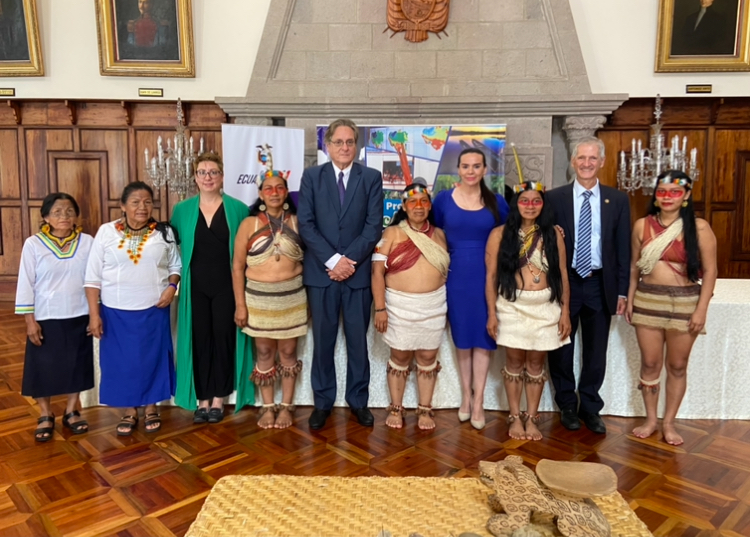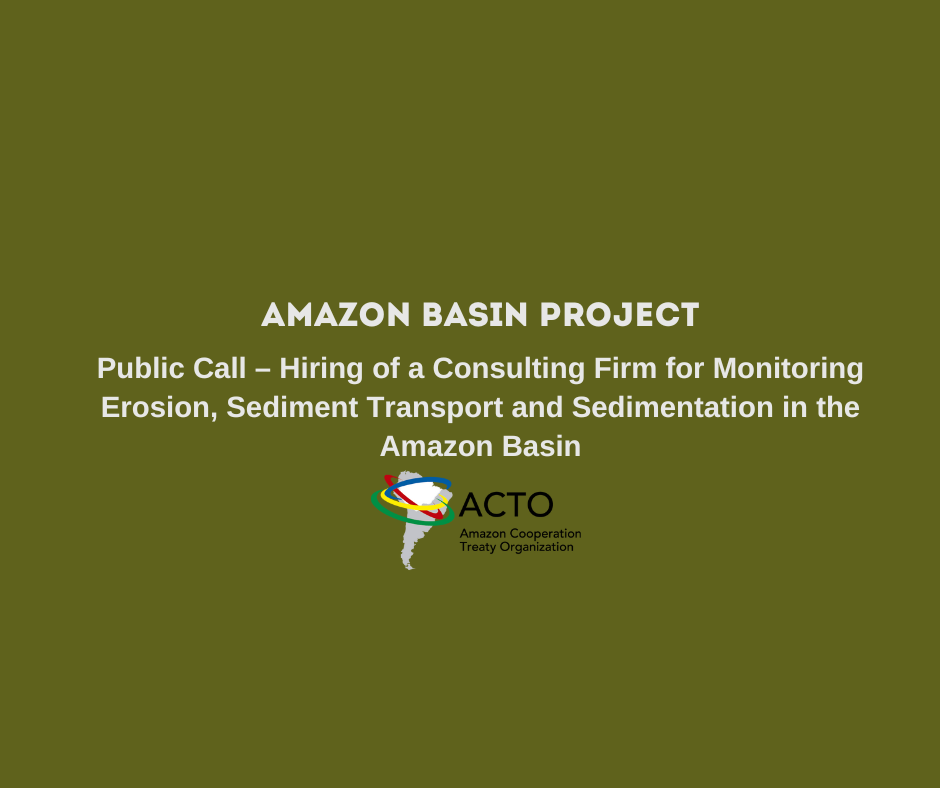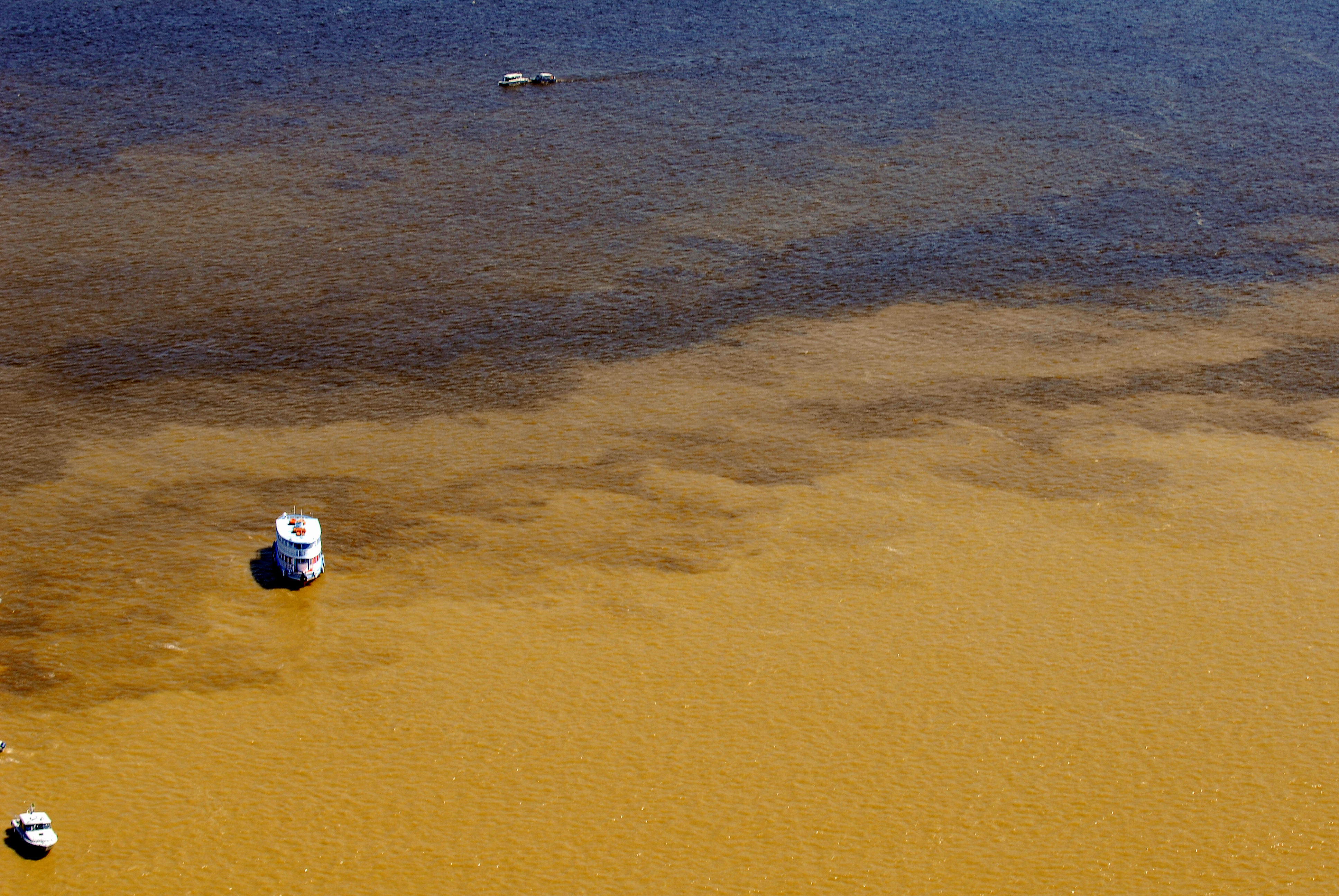Carlota Toca and Cawo Boya, two indigenous women leaders of the Waorani people, arrived in Quito a day before the start of the National Workshop for the Implementation of the SAP, an event held on May 30 and 31 with the aim of promoting collective participation in the formulation of specific actions for the management of Amazonian waters in Ecuador. In the large hall of the Ministry of Foreign Affairs and Human Mobility building, where the workshop took place, the two leaders set up a table to display handicrafts traditionally made by Waorani women. However, Carlota and Cawo’s activities over the next two days of the workshop were not restricted to selling their products. They actively participated in the discussions promoted by the culture and education group and in the gender training, as well as performing a traditional dance of their people at the opening ceremony of the event.
“I’m taking part in this workshop so that I can improve and help my community and all the indigenous communities in the Ecuadorian Amazon. I want them all to live well. By them and for them, we are playing an important role here in strengthening water care in the region,” emphasized Carlota during her first speech at the workshop, in which she also highlighted the fundamental role of women and indigenous communities in water management and conservation.
The PAE Implementation Workshop in Ecuador brought to a close a cycle of similar events held in the eight Amazonian countries as part of the Amazon Basin Project, all of which were participatory and aimed at discussing and proposing actions for Integrated Water Resources Management (IWRM) in the Amazon Basin. As the first Regional Cooperation Strategy for IWRM, the SAP provides for the preparation of National Action Plans, a process which the participants in this cycle of workshops have been invited to take part in.
“The workshops are the driving force behind the implementation and feedback of the SAP and offer significant contributions to the consolidation of national policies, identifying training needs in the countries and the support required to move the program forward. This includes both the technical issues of integrated management of the Amazon’s water resources and the cross-cutting issues of culture, education and gender,” said the Administrative Director of ACTO, Edith Paredes, at the opening of the event in Quito.
His words followed those of the Under-Secretary for Latin America and the Caribbean, Santiago Apunte, who reinforced Ecuador’s commitment to the SAP. “For us, the implementation of this program has been strategic, since it not only focuses on water resource management, but also seeks to increase the capacity of the communities to adapt to the impacts of climate change, strengthen water governance and ensure the availability of solid and compatible data for coordinated decision-making at national and regional level,” said Apunte.
Highlighting the transboundary challenges related to water and climate change, Deputy Minister of Water María Luisa Cruz of the Ministry of Environment, Water and Ecological Transition cited the willingness of the participants to identify priority actions, develop capacities and promote gender equity in all initiatives. “I am sure that by working together we can build a more sustainable and equitable future for all the families that depend on the Amazon’s water resources,” she said.
Actively working in two thematic groups – IWRM and culture and education – and the gender training, offered with the aim of promoting skills for the inclusion of gender equity in plans, programs, projects and policies, the workshop participants shared their experiences and innovative ideas for the implementation of the SAP.
The IWRM group’s contributions included mapping the progress Ecuador has made in water management and the aspects that need to be developed, such as strengthening the Basin Councils and participatory management of water resource management plans. The culture and education group, meanwhile, formulated strategies to incorporate the cultural, artistic and educational vision of the indigenous peoples and traditional communities of the Ecuadorian Amazon into the SAP’s actions, such as the formation of a network of young communicators and activists to connect the indigenous and traditional communities of the eight Amazonian countries.
During the gender training, the participants practiced using the central tool of the training, the Gender Mainstreaming Scanner (developed by ECLAC and the German Agency for International Cooperation-GIZ), carrying out rapid diagnoses and formulating some strategies for implementing the gender perspective in two specific projects.
Since 2021, the Amazon Basin SAP Implementation Project has been supporting the eight member countries of the Amazon Cooperation Treaty Organization (ACTO) in implementing the Strategic Action Program (SAP) and promoting Integrated Water Resources Management in the Amazon Basin in a source-to-sea continuum. Based on the SAP strategic response lines, the project aims at institutionally strengthening water governance in the eight Amazonian countries and at the regional level, building community resilience and protecting aquatic ecosystems to address climate change, as well as monitoring water resources and ecosystems through a Regional Environmental Monitoring System. Implemented by the United Nations Environment Programme (UNEP) with financing from the Global Environment Facility (GEF), the project is executed by ACTO.



